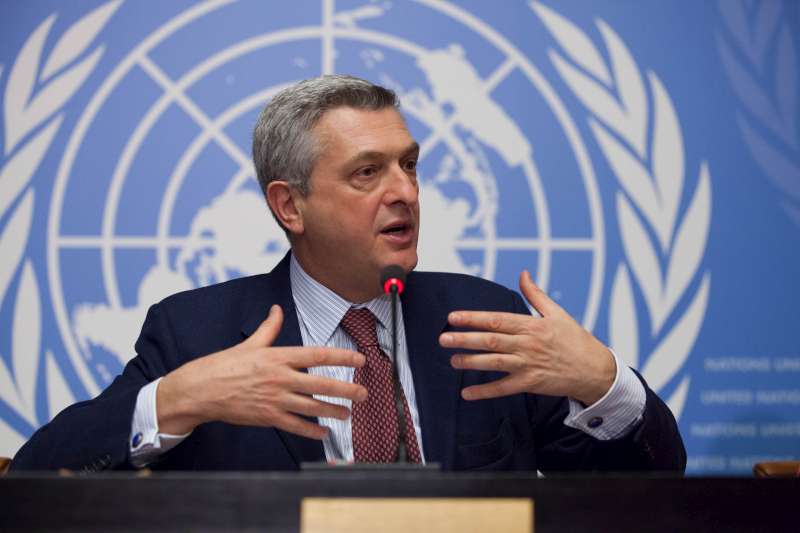In the fall of 2015, there was explicit criticism of previous High Commissioner of Refugees, Antonio Guterres, as it was argued that his ambitions of becoming the new United Nations Secretary General was getting in the way of confronting European states more explicitly to ensure that they live up to their responsibility as stated in the 1951 Refugee Convention:
“The heads of U.N. agencies with ‘well-nourished careers’ prefer to ‘put out cutesy heart-warming videos’ about individual refugees rather than criticize governments… They want another U.N. job … And they won’t get it if they piss governments off. You have to start shaming governments. That’s how things get done.”
A New Path under High Commissioner Grandi?
Now things may be changing. Prior to the much debated EU-Turkey refugee deal, the new UN High Commissioner for Refugees, Filippo Grandi, stated that the potential refugee bottleneck in Greece was a major topic of discussion. And during a February 2016 visit to Athens, he took the opportunity to criticize “the border closures and the inability of European countries to face the refugee crisis with generosity and unity”. Only weeks later (in March 2016), the organization explicitly distanced itself from the EU-Turkey plan, as potentially undermining the tenants of international refugee protection.
Arguably this marks a shift in how UNHCR interprets and enacts its function as a key international actor tasked with the important job of holding states accountable to their commitments to international refugee protection (1951 Convention). And now that the EU-Turkey deal has become is a reality, it is certainly worth noticing that UNHCR was not part of the deal making. Instead, UNHCR is now looking to the future: “Let’s see what the European courts has to say on this,” said Vincent Cochetel, who is leading the UNHCR’s response to the crisis in Europe. A deal might be legal if Turkey overhauls its asylum system and guarantees that those returned are not kept in detention and are given a proper chance of claiming refuge, which is not currently the case, says Mr Cochetel. Other than Europeans, only Syrians have any right to claim shelter in Turkey under its current system. Accordingly, in line with UNHCR’s policy on opposing mandatory detention, the organization has suspended provision of transport to and from detention sites on Greek islands, and has also expressed concern that Greece may have deported asylum seekers by mistake, in violation of international law.
Good Enough Accountability as Existential Challenge
These contradictory examples illustrate what amounts to an existential challenge not only for UNHCR, but for the humanitarian enterprise as a whole, namely the quest for good enough accountability. In situations where the host state may be unable or unwilling to protect civilians, humanitarians step in to provide governance, care and protection. With a record-high number of humanitarian emergencies and displaced individuals worldwide, there are more humanitarian organizations doing more things in more places than ever before. They are not elected and are mostly unencumbered by legal obligations towards the communities they proclaim to work for. While the humanitarian sector has developed its own ‘accountability-industry’, humanitarians continue to express concern about how accountability-initiatives are skewed towards donors, at the expense of accountability towards crisis-affected communities and individuals. At the same time, there is deep disagreement about what good enough accountability might look like, how it might be achieved and what resources humanitarians and donors would be willing to invest towards reaching a satisfactory level of accountability.
A Knowledge Gap: Conceptualizing the History and ‘technologies of accountability’
Despite the key importance of accountability for the legitimacy of humanitarian action, inadequate academic attention has been given to how the concept of accountability is evolving within the specific branches of the humanitarian enterprise. Up to now, there exists no comprehensive account of what we label the ‘technologies of accountability’, the effects of their interaction, or the question of how the current turn to decision-making software and biometrics as both the means and ends of accountability may contribute to reshaping humanitarian governance.
In a recent book, UNHCR and the Struggle for Accountability: Technology, Law and Results-Based Management (Routledge Humanitarian Studies series) we explore UNHCR’s quest for accountability by viewing the UNHCR’s accountability obligations through the web of institutional relationships within which the agency is placed (beneficiaries, host governments, implementing partners, donors, the Executive Committee and UNGA). The book takes a multidisciplinary approach in order to illuminate the various layers and relationships that constitute accountability and also to reflect on what constitutes good enough accountability.
Table of Contents:
- Introduction: The Quest for an Accountability Cure Katja Lindskov Jacobsen & Kristin Bergtora Sandvik
- UNHCR and the Complexity of Accountability in the Global Space Niamh Kinchin
- Advancing UNHCR Accountability through the Law of International Responsibility Maja Janmyr
- Narratives of accountability in UNHCR’s refugee resettlement strategy Adèle Garnier
- UNHCR and accountability for IDP protection in Colombia Miriam Bradley
- Universalizing the refugee category and struggling for accountability: the every-day work of eligibility officers within UNHCR Marion Fresia and Andreas von Känel
- Accounting for the Past, A history of refugee management in Uganda, 1959-64 Ashley B. Rockenbach
- How accountability technologies shape international protection: results-based management and rights-based approaches revisited Kristin Bergtora Sandvik
- UNHCR, Accountability and Refugee Biometrics Katja Lindskov Jacobsen
